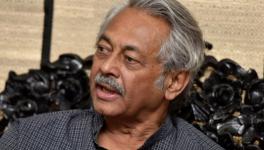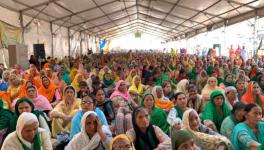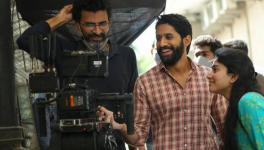Burden of Inheritance: Mothers and Daughters in Shakuntala Devi
Maa (Mother) is the word Anu Menon’s Shakuntala Devi kickstarts with. This fictionalised account of the life of India’s mathematics genius—as the disclaimer states upfront—looks at her from the daughter’s standpoint and it is not exactly a flattering portrait.
Yes there is the numbers game, the race against the computer, the place in the Guinness Book of World Records, the book on homosexuality, the pronounced political ambition and unsuccessfully contested election for the on-screen Shakuntala Devi played by a casually-confident and infectiously zesty Vidya Balan. But all this detail is presented in passing. The film is not so much about the professional domain of the strong and independent woman Shakuntala Devi was, but how that messes up her personal space—the far from perfect marriage, family, home. In fact, the film begins with the daughter filing a criminal case against her mother and then goes back and forth the events leading to it.
On the face of it, the film appears to be a welcome break from the pious box that Hindi cinema has largely shackled mothers in, but eventually, rather than truly unchain them of expectation, it tiptoes around the righteous and revered cross of motherhood that women are made to bear, on and off screen.
As cinephiles are aware, in the well-worn tradition of Hindi cinema, the mother has for long been pedestalised; considered an equivalent of god. A song from LV Prasad’s 1966 film, Daadi Maa—“O maa teri soorat se alag bhagwan ki soorat kya hogi—O mother, would god look any different from you”—tried to see the divine reflected in the mother and find heaven by her feet. “Meri nindiya ke liye barson soyi na—She didn’t catch a wink for years so that I could sleep in peace”, went the song in OP Ralhan’s Talash (1969), that speaks of the world revolving around the mother figure. Over the years, films like Mother India (1957) and Deewar (1975), built on the mythology of the mother who would not just put her own life at stake for the good of her kids but even sacrifice her progeny for the even greater good of the society, nation and humankind.
Having covered quite a distance from there, Hindi cinema has of late been offering some freshness, spark and contemporaneity to the mother-daughter dynamic, if not entirely breaking away from the coded formalism, formalities and hierarchies of this zone. The mother might be the confidante, a bestie to her daughter, as in Aditya Chopra’s Dilwale Dulhania Le Jaayenge (1995). Then there was the rare show of camaraderie in Advait Chandan’s Secret Superstar (2017), in which the mother lived her dream vicariously through her daughter even as the daughter worked to liberate her mother from a claustrophobic and abusive marriage. The going wasn’t always smooth for a tolerant mother and her rebellious teenager in Ashwiny Iyer Tiwari’s Nil Battey Sannata (2015). About an underprivileged house-help trying to educate her daughter to secure her future, this film rested on one central relationship that resonated with love and banter as well as quarrels and conflicts.
Earlier, Gauri Shinde’s English Vinglish (2012) underlined a certain callousness towards the mother, who was taken for granted by the family, particularly her daughter. Here was a one-way street—a lot was demanded of the mother but rarely were her own expectations approximated, forget being met. The mother forged an identity away from the family, but without necessarily breaking away from it.
Things get a lot more fraught between mothers and daughters in Shakuntala Devi though they are still not as thorny as the swing between the adversarial and the friendly in, say, Greta Gerwig’s The Ladybird (2017). Yet Shakuntala Devi does introduce a new narrative—motherhood on the rebound, a reaction against the experiences that women have derived from their mothers. Expectations and disappointments, anger and reconciliation across three generations of mothers and daughters come to pass. Women shed the burdens of their inheritance, of what seem like unwelcome and undesired role models. Shakuntala is unforgiving of her mother because she could never squeak a word in front of her authoritarian father. Why not as much anger against the exploitative father, who treated her like a source of income and no more, you wonder.
Anyhow, Shakuntala chooses mathematics and numbers, decides to be atmanirbhar and amazing, believes in enjoying life to the fullest and laughing uproariously, much to the discomfiture of men. (She does all of it while draped in colourful saris and pigtails with matching ribbons.) These are her ways of making a feminist statement against a conservative world. She preserves her identity through marriage, motherhood and domesticity. “Main sirf maa nahin hoon, main ab bhi main hoon—I am me, myself, and not just a mother,” she says, convincingly. So far so good. But it is the inevitable flip side, the eventual moral framing of her, that bring things back to square one.
We have been celebrating the film as a rare “biopic” that is not laudatory, that portrays a mother who is “flawed”. But then why should her character traits be seen as “imperfections” in the first place? What is “wrong” with a mother who is free-spirited and ambitious and does not settle for less than what she deserves? Are drinking, travelling the world, asserting herself as an individual dubious things? Or do we sub-consciously hang on to different sets of expectations from working mothers as opposed to, say, single working women? Are mothers not allowed to be messed up, even in our collective imagination, let alone for real?
Somewhere along the line things start getting reactionary as Shakuntala’s daughter’s viewpoint overrides all else. A multiplicity of perspectives than just the singular gaze of the daughter could have perhaps opened up a complex character, allowed more varied and nuanced interpretations. But being a genius is turned into a liability rather than an asset for Shakuntala: the strong-willed lapses into the domineering, cussed, manipulative and possessive; someone who feels so guilty about leaving her daughter behind that she turns her into a metaphorical “suitcase” which she travels all over the world with. In the process, she separates daughter from father and denies her schooling and education. The daughter is so uncomfortable living in Shakuntala’s shadow that she does not want to become her mother. As one of the songs goes, the mother is more a puzzle to her than someone close: “Tu hai koi paheli, maa ban ja na tu meri—you are a puzzle, mother won’t you just be mine”.
Eventually, life does come full circle and daughters reconcile with mothers, though a trifle too easily, hurriedly. But something vital of the “beautiful mind” gets diminished in the simplification and particularity of perspective. It leaves you with a feeling of discontentment, as though many pieces in the puzzle called Shakuntala Devi are still missing.
Shakuntala Devi makes one look back in appreciation at Rituparno Ghosh’s Unishe April which featured an estranged mother (Aparna Sen) and daughter (Debashree Roy), dancer and doctor respectively. On the death anniversary of the father, all their pent-up resentment, pain and anger come storming out. Did the mother’s commitment to her art and journey to self-realisation lead her to neglect her daughter? Did the husband nurse a grudge against her popularity and success? Will the misunderstanding, conflict and bitterness between mother and daughter ever clear? Can they forgive and move on? Ghosh’s film is what Shakuntala Devi is not—an acute, in-depth, intense and well-rounded exploration of two individuals and their relationship—that does not side with one, but is an ally of both.
Seen in this light, Bhaskar Hazarika’s recent Assamese film, Kothanodi (River of Fables, 2015), is tremendously significant. Refreshingly free of judgment in portraying mothers and as much folksy as edgy, it is based on the Assamese compendium, Buri Ai’r Sadhu (Grandma’s Tales). It weaves together four stories about four mothers struggling with their inner demons. If one is intent on marrying her daughter with a python, another plots the murder of her stepdaughter. This intriguing film, with its mix of the real and surreal, takes mothers beyond patriarchal frames of reference and gives them liberty to embrace their frailties and dark sides without a care or concern.
The author is an independent writer and film critic. She wrote Reel India: Cinema off the Beaten Track, published by Hachette in 2019.
Get the latest reports & analysis with people's perspective on Protests, movements & deep analytical videos, discussions of the current affairs in your Telegram app. Subscribe to NewsClick's Telegram channel & get Real-Time updates on stories, as they get published on our website.
























